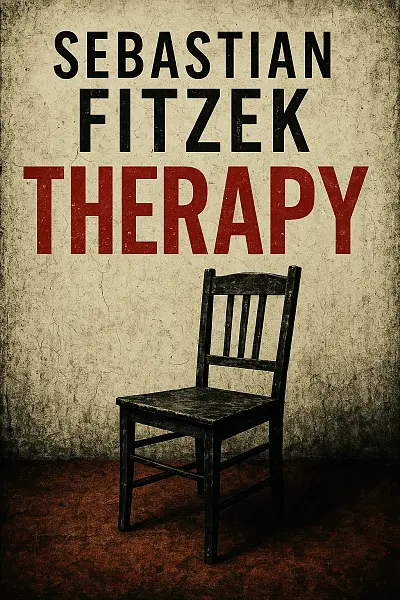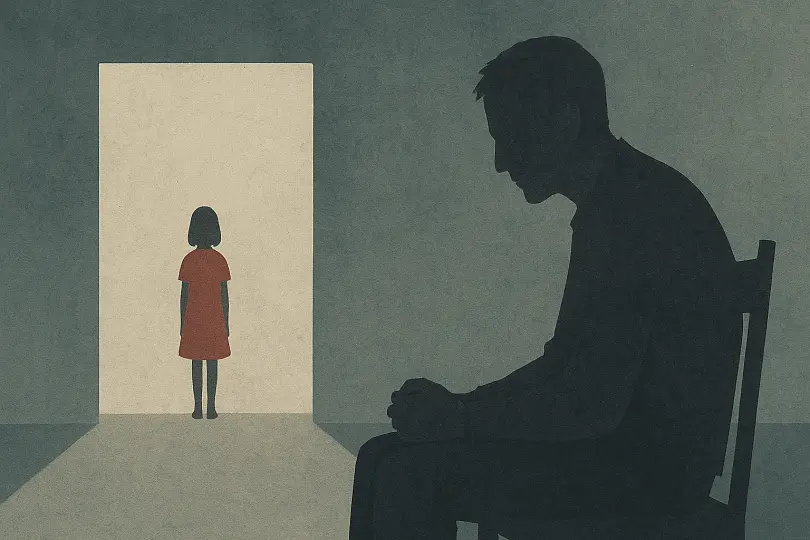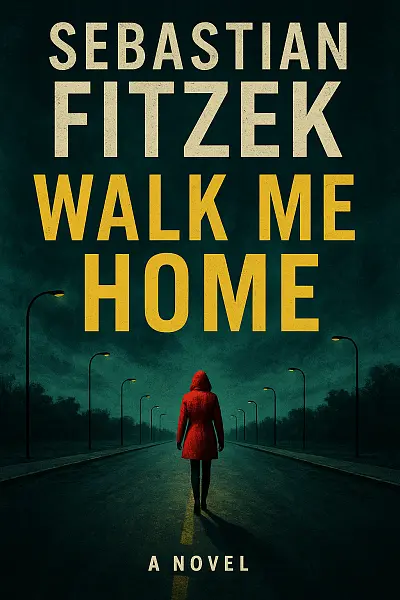
Therapy
by: Sebastian Fitzek
Viktor Larenz, a renowned psychologist, retreats to a lonely North Sea island after the devastating disappearance of his daughter, Josy. Years pass, his world upended by grief, when Anna Glass, an enigmatic novelist, appears at his door, claiming her written characters come to life—and one mirrors Josy’s fate.
Intrigued yet skeptical, Viktor agrees to treat Anna, desperate for any clue to his daughter’s vanishing. As their therapy sessions spiral, the line between reality and delusion blurs, forcing Viktor to confront terrifying truths about his own mind. Will answers finally break Viktor—or will the mystery consume him whole?
This psychological thriller crackles with tension and a moody, claustrophobic vibe.
""Sometimes the mind hides the darkest truths behind the brightest illusions, and healing begins only when we dare to see what we fear most.""
Let's Break This Down
The Author's Voice
Atmosphere:
Darkly claustrophobic, intensely psychological. Fitzek crafts a suffocating sense of dread that never quite lets up. The setting—a secluded island clinic shrouded by fog and isolation—feels palpably oppressive, almost gothic. Every page hums with tension, paranoia, and the unnerving suspicion that reality itself might be treacherously unstable.
Prose Style:
Lean, urgent, and focused on impact. Fitzek writes with brisk precision—short chapters, clipped dialogue, and punchy descriptions that zoom in on unsettling details. The language is direct and economical, rarely indulging in lyrical flourishes, but always drawing the reader deeper into a fractured mindscape. There’s a cinematic clarity here: you can feel the chill, hear the echoing silence, see every flicker of anxiety.
Pacing:
Relentlessly fast, with very few slow burns. This book is designed to be devoured in breathless, late-night sprints. Cliffhangers abound, revelations hit hard and at a regular rhythm, and there are barely any pauses to catch your breath. Flashbacks and time-jumps keep things off balance but cleverly sustain suspense throughout—the kind of pacing that dares you to put the book down and almost guarantees you won’t.
Characterization:
Psychologically charged, but sometimes intentionally unreliable. Fitzek digs deep into trauma, obsession, and grief, painting characters more through their fears and delusions than straightforward traits. You’re often left questioning what (and who) you can trust, which builds the overall sense of unease but sometimes keeps emotional depth at a distance.
Mood & Feel:
Intense, unsettling, and wildly addictive. This isn’t a cozy mystery—it’s a dark, twisting journey through the shadowy corridors of the mind, perfect for readers who crave psychological thrills and don’t mind having the rug yanked out from under them again and again. Expect sleepless nights, frayed nerves, and an irresistible urge to see what’s lurking just around the next corner.
Key Moments
- Chilling disappearance: Josy vanishes in a blink, leaving her psychiatrist father unraveling at the seams
- Storm-lashed island setting amps the claustrophobia—danger feels just one locked door away
- Distorted realities: Every conversation drips with uncertainty, making you question what’s true
- Another patient’s wild manuscript spirals into meta-mystery—fiction bleeds into brutal fact
- Guilt, memory, and obsession swirl—can you trust anyone, even yourself?
- Gut-punch chapter reveals: Forget what you thought you knew about Josy’s fate
- Taut pacing, relentless mind games—you’ll want to read with the lights on!
Plot Summary
Therapy by Sebastian Fitzek starts with renowned psychiatrist Dr. Viktor Larenz, whose young daughter, Josy, mysteriously vanishes during a doctor's visit. Four years later, Viktor retreats to a secluded island to cope with his grief, but his isolation is shattered by the arrival of Anna Glass, a troubled novelist plagued by hallucinations about a missing girl. As Viktor agrees to help Anna, the boundaries between reality and delusion blur, leading to a twisted psychological cat-and-mouse game. The story crescendos with Viktor discovering that Anna is a manifestation of his own fractured mind and that he himself was responsible for Josy’s death, having accidentally killed her and repressed the memory. The novel closes with Viktor institutionalized, haunted by the truth and the inescapable consequences of his actions.
Character Analysis
- Dr. Viktor Larenz is a textbook example of an unreliable narrator. Driven by love and loss, his search for Josy consumes him, and his descent into madness is revealed with chilling precision. He moves from grieving father to a man shattered by guilt, and his psychological unraveling is the pulse of the novel.
- Anna Glass, initially appearing as a patient, is ultimately understood to be a construct of Viktor’s psyche—a manifestation of his conscience, forcing him to confront the truth. Her fragmented, enigmatic traits mirror Viktor’s own crumbling mental state.
- Josy Larenz, though physically absent for most of the book, is at the emotional center of the story. Her illness and disappearance set everything in motion and symbolize Viktor's battle between denial and acceptance.
Major Themes
The line between reality and illusion is central, as Fitzek constantly unsettles the reader’s perceptions through Viktor’s unreliable narration—what seems external is often just Viktor’s internal struggle. Grief and guilt thread the plot; Viktor’s desperate attempts to find Josy reflect his refusal to face the unbearable truth of her fate. The theme of mental illness is woven throughout, challenging stigmas by depicting both overt madness and the subtle, creeping onset of psychosis. Fitzek probes the dangers of unchecked denial, showing how our minds can become prisons of our own making.
Literary Techniques & Style
Fitzek’s writing is razor-sharp and twist-driven, relying heavily on short, punchy chapters and cliffhangers to fuel suspense. The first-person perspective immerses readers in Viktor’s fractured world, skillfully utilizing the unreliable narrator device to distort reality. Symbolism abounds—silent islands mirror Viktor’s isolation, and Anna’s fictional characters serve as metaphors for repressed emotions. Fitzek’s use of red herrings and misdirection keeps tension sky-high, culminating in a shocking reveal that prompts a re-examination of earlier events.
Historical/Cultural Context
Set in contemporary Germany, the novel unfolds in a modern, privileged world where even the best doctors are not immune to tragedy or mental breakdown. The island setting heightens a sense of claustrophobia and psychological introspection, a nod to the European tradition of psychological thrillers. The novel also quietly engages with themes of German society’s relationship with mental health stigma and the expectation of flawless professionals.
Critical Significance & Impact
Therapy solidified Fitzek’s reputation as a master of the psychological thriller in German popular literature, earning wide acclaim for its innovative twist and intense atmosphere. The novel’s ruthless deconstruction of its protagonist’s psyche inspired comparisons to classic unreliable narrators, and it sparked discussion on mental health, memory, and guilt in modern thrillers. Its lasting appeal lies in its ability to shock, disturb, and make readers question the boundaries of their own perceptions.

A missing child, a haunted mind—truth unravels where sanity shatters.
What Readers Are Saying
Right for You If
Who’s Going to Love Therapy?
If you’re all about twisty psychological thrillers that mess with your head, this one’s definitely calling your name. Fans of Gillian Flynn, Paula Hawkins, or even Sebastian Fitzek’s other wild rides—you’re in for a treat here. The whole missing child mystery? Super addictive. If you love piecing together puzzles and absolutely living for big reveals, you’ll be turning pages late into the night.
People who enjoy those books where you don’t really trust anyone and things get darker and more mind-bending by the chapter—this is prime territory for you. If you’ve got a soft spot for stories that dig into trauma, secrets, and the messiness of the human mind, Fitzek’s all about that.
But, heads up, if you’re looking for cozy mysteries or you’d rather avoid dark, psychological stuff that sometimes gets a bit intense or grim, you might want to steer clear. Readers who like slow-burn, character-driven stories over plot-driven, high-octane suspense might find this a little too fast or twisty to settle in with. Also—if you hate unreliable narrators or books where reality is always shifting, this might get on your nerves.
So basically: fans of dark, twisty, fast-paced thrillers—grab it. Lovers of light, heartwarming reads or cozy mysteries—maybe skip this one.
What You're Getting Into
Imagine being a celebrated psychiatrist whose young daughter vanishes without a trace...
In Therapy by Sebastian Fitzek, Dr. Viktor Larenz retreats to a secluded island, desperate to escape his grief and unanswered questions. When a mysterious woman seeking his help appears, claiming visions eerily linked to his missing girl, Viktor is pulled into a mind-bending search for truth.
Dark, twisty, and relentlessly suspenseful, this psychological thriller will keep you second-guessing everything—and everyone—right until the final page.
Characters You'll Meet
-
Viktor Larenz: Renowned psychiatrist and grieving father searching for answers after his daughter Josy’s mysterious disappearance. His emotional turmoil and quest for truth drive the psychological tension of the story.
-
Anna Spiegel: Mysterious patient who claims to suffer from schizophrenia and brings disturbing stories related to Viktor’s missing daughter. Her erratic behavior and cryptic tales blur the line between reality and delusion.
-
Josy Larenz: Viktor’s young daughter, whose unexplained illness and sudden vanishing set the entire plot in motion. She remains an elusive presence, haunting Viktor’s every move and memory.
-
Isabelle Larenz: Viktor’s wife, struggling to cope with Josy’s disappearance and her husband’s obsessive search. Her strained relationship with Viktor adds emotional complexity to the narrative.
-
Professor Grohl: Viktor’s colleague and confidant, providing professional insights and support. He serves as a grounding presence but is ultimately caught in the story’s web of uncertainty.
More Like This
If psychological thrillers are your jam, Therapy by Sebastian Fitzek will give you that Shutter Island vibe—think unreliable realities, missing persons, and a protagonist whose sanity unravels as the pages turn. The way Fitzek blurs the line between truth and delusion is reminiscent of Dennis Lehane’s masterpiece, so fans of driving suspense and twisty revelations will feel right at home here.
In another vein, Therapy pulses with the oppressive tension and mind games found in Gone Girl by Gillian Flynn. Both books have you constantly second-guessing every character’s motive, and Fitzek’s knack for slow-burn psychological drama channels that sense of mounting dread—perfect if you love thrillers that keep you furiously flipping pages to unearth the next secret.
Cinematically, Therapy echoes the haunting, claustrophobic atmosphere of the series The Sinner. The eerie island setting, broken memories, and deep dives into trauma-held pasts bring a similar sense of "something’s off—wait, what’s REAL here?" The show’s methodical peeling back of psychological layers is right in line with what makes Fitzek’s novel so morbidly engrossing.
So if you’re looking for a mind-bender that’s equal parts atmospheric and psychologically intense, Therapy will give you those deliciously dark chills you crave.
Critic's Corner
What if the search for truth is just another descent into madness?
Sebastian Fitzek’s Therapy pries open this unsettling question, holding up a mirror to our collective fear of losing both loved ones and the boundaries of reality. At its core, the novel insists we confront not just what happened to missing Josy, but what it means to truly know—ourselves, others, the events we cannot bear to face.
Fitzek’s style is nothing if not relentless. Short, punchy chapters snap by with breathless momentum, constantly raising the emotional stakes. His prose is clean and sharp, eschewing literary flourish for the brutal elegance of a well-aimed scalpel. Dialogue is fast and loaded, and while some exchanges veer toward melodrama, they reliably inject tension. The narrative voice is tightly tethered to Viktor’s unraveling mind; unreliable and claustrophobic, it sweeps the reader into a fever dream where every detail is suspect. Fitzek masterfully orchestrates ambiguity, exploiting the reader’s expectations with a deft hand—twisting narrative threads until they snarl and fray. If you adore psychological cat-and-mouse games, you’ll be hooked by the way Fitzek weaponizes confusion; if you prefer steadier ground, the constant instability may frustrate. Yet, the brisk pace rarely allows time for boredom, and despite occasional heavy-handed exposition, the writing packs a visceral punch.
Thematically, the novel’s engine is trauma and the fragile boundaries separating reality from delusion. Fitzek probes the psychological aftershocks of loss: how memory both heals and destroys, how denial shrouds truth in impenetrable mist. Anna Glass’s claim that her fiction manifests in real life is a sly meta-comment on storytelling itself, asking whether narrative can ever truly capture horror or if it simply muddles trauma further. There are echoes here of cultural anxieties about mental illness, the limits of psychiatry, and our desperate need for certainty in a chaotic world. The setting—an isolated North Sea island—becomes a metaphor for Viktor’s psychological exile, intensifying the sense of existential dread pervading every page. Fitzek doesn’t shy away from moral ambiguity; he dares us to question both Viktor’s guilt and innocence, humanity and monstrosity. This interplay delivers a jolt of emotional rawness but stops just short of genuine philosophical depth, opting for suspense over reflection.
Within the canon of European psychological thrillers, Therapy is a standout in its sheer audacity. While reminiscent of the unreliable narrator tradition seen in works by Mark Z. Danielewski or Gillian Flynn, Fitzek’s particular brand of hallucinatory plotting and emotional urgency gives the novel a distinctively German sensibility: precise, somber, and unafraid of psychological darkness. Fans of Fitzek’s other twist-laden thrillers will find the hallmarks here, but Therapy feels especially propulsive and intimate.
All told, Therapy is a gripping and atmospheric mind game that excels in pacing and tension, while sometimes sacrificing nuanced character development and thematic subtlety. The ending may polarize, but the book’s relentless energy and emotional stakes ensure it lingers long after the final page. For psychological thriller lovers, it’s a memorably unsettling ride—just buckle up for vertigo.
Community Thoughts
i STILL CAN'T SHAKE VIKTOR LARENZ from my mind. Fitzek made him so deeply flawed and desperate, I felt his paranoia crawling under my skin. That endless search for answers left me double-checking my own reality.
That scene where Josy vanishes from the waiting room is seared into my brain. I literally had to put the book down and check my own door locks. Fitzek knows how to twist reality until you question everything.
i read this book late at night and the moment viktor realizes the truth about his daughter made me freeze in bed, unable to sleep. fitzek’s twists kept my mind racing long after i turned the last page. haunting yet brilliant.
Right in the middle when Viktor realizes the truth, my brain just broke. I reread that scene over and over, chills every time. Fitzek is a menace for that plot twist.
I never thought a missing child story could mess with my head this much. Viktor's desperation bled into my dreams and I actually woke up sweating. Fitzek's twists are evil genius level. Sleep? What’s that?
Leave Your Review
Local Take
Why It Matters
Sebastian Fitzek’s "Therapy" has a unique resonance with German readers, particularly given Germany’s complex relationship with trauma, memory, and psychological introspection. The book’s unsettling dive into the human psyche echoes the nation's postwar culture of confronting uncomfortable truths, paralleling historical reckonings like Vergangenheitsbewältigung (coming to terms with the past).
- Psychological thrillers are a local favorite, and Fitzek’s fast-paced, claustrophobic narrative fits right in with German tastes for taut, intellectual suspense.
- The novel’s focus on mental health and therapy strikes a chord in a context where seeking psychological help is becoming less stigmatized yet still lingers with taboo—a tension that mirrors Viktor Larenz’s struggle.
Some plot points, like the island isolation and unreliable narration, hit harder in a nation where personal privacy and control are deeply valued—making Viktor’s unraveling especially disturbing. Fitzek’s labyrinthine twists blend with a tradition of German crime fiction, but the overt psychological focus feels refreshingly modern, challenging older, more procedural styles.
Food for Thought
Therapy by Sebastian Fitzek has achieved remarkable international success, selling over a million copies and establishing Fitzek as one of Germany's leading thriller authors, with the novel being translated into more than two dozen languages and sparking renewed global interest in German psychological thrillers.
Like what you see? Share it with other readers







